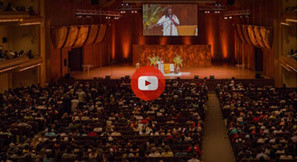Mon, 08/29/2011 Afghanistan
What is the mystery behind karma?
Sri Sri Ravi Shankar:
: As you sow, so you reap. Isn’t it? There is a couplet(shlok) that defines Raajasic intellect as that which discriminates among individuals, whereas Saatvik intellect treats everyone alike seeing the same divinity in all. So during meditation, when the saatvik intellect awakens, think of those to whom you feel attached as manifestations of the divine, and those towards whom you feel enmity, also as manifestations of the divine. This is all merely a game. The same divine manifesting in different colours has also manifested within me, as me.
How many of you experienced it today?( Many in the crowd raise their hands. )
‘Sarva bhuteshu yena ekam bhavam avyayam ikshate avibhaktam vibhaktesu tat gyanam viddhi satvikam’
That which is uninterrupted / undivided at all times – the same indivisible mind in discrete bodies, the same indivisible space which appears separate in ten different bowls - one who sees this unity in diversity is extremely special. The ability to experience this state of unity even for a little while in meditation is present in the aatvic consciousness, although one cannot remain in this state forever.
A raajasic mind is one that focuses on the differences (disparateness) among all beings / individuals.
Taamasic intellect is that which is stuck in one point of view, and lacks the ability and willingness to look beyond; a thought comes to the mind and becomes permanently rooted – small /narrow mindedness. Say for instance, one forms a negative opinion of someone, treats them unfairly and then uses all means and arguments to justify that behaviour or stand point. You see many people in this taamasic mindset all around. They stay trapped in their preconceived notions. The idea that meditation, yoga etc. are useless, and all saadhus (Sages) and sanyaasis (hermits) are imposters, hypocrisy remains firmly embedded in their minds. They are unwilling to alter their opinion even when contrary evidence is provided. This is taamasic attitude or knowledge.
I will tell you a story; Mullah Nasruddin had a thought that he was dead. He began to deny everything with the argument that he was dead. If his wife said something to him, he would say, ‘how can a dead man reply?’ If she asked him to do any work, he would say, ‘how can a dead man do anything?’ So finally his wife got fed up and took him to a psychiatrist. After a lot of discussion, the psychiatrist asked mullah, if blood comes out of a dead body. Mullah said ‘no, blood becomes water’. So the psychiatrist took out a pin and pricked mullah’s hand, and blood came out. ‘Look mullah, you are bleeding, so you are alive!’ said the psychiatrist. Then Mullah looked at the oozing blood and said, ‘Oh, today I have learnt a new thing – even dead men bleed!!’
This is taamasic knowledge. Saatvik knowledge is essential in life. Through Saatvik knowledge, God can be found. For earthly life, some raajasic knowledge (discrimination) is needed. Taamasic knowledge increases sorrow, suffering and ignorance.
Gurudev, many times I have dreamt of you and I and others. Who is the witness in the dream?
Sri Sri Ravi Shankar:
This is what you need to discover, ‘Who am I?’
Negative opinions such as anger, worry and regret arise spontaneously, whereas we have to make a conscious effort to awaken positive emotions, and sometimes in that effort, negative emotions begin to arise. Why does this happen – please show us the way?
Sri Sri Ravi Shankar:
Look, these negative emotions come and go, when you are very tired, have low Prana or are sad and depressed. However, only positive emotions arise when pPrana levels are high and you are happy. So, negative emotions reflect a deficiency of Prana.
When everything happens through the law of karma, what is the role of God?
Sri Sri Ravi Shankar:
This law is God. The law by which everything is happening is God.
Gurudev, how to increase saatvic knowledge in life?
Sri Sri Ravi Shankar:
By means of what you just did: going beyond the three gunas (Saatvic, Raajasic and Taamasic) through meditation. In meditation we get deep rest and freshness, purity, peace and joy arise spontaneously. How does joy arise - when you are at peace, at rest. That is why it is said, ‘nistraye gunyo nitya satvastu ’: as you rise above the three gunas, Sattva increases. Do not be attached even to good deeds. Drop everything. In deep rest none of these gunas exist. In sleep there is tamo guna, in work there is rajo guna, and when you are not working or engaged in thought, there is sato guna. When you sit in meditation, in that state of thoughtlessness, you transcend the three gunas; and when you come back, sattva rises. By the way, rajo guna is useful in getting rid of tamo guna through awakening frustration and anger. As sato guna increases, rajo guna quiets down. And when you get past sato guna also, sattva is enhanced.
Gurudev, at the time of death, does someone come to escort us? Two years ago, my father passed away. At the time of his passing, he appeared to be telling someone, ‘wait, I am coming’. When he was in pain, we would chant ‘Jai Guru Dev, Om Namah Shivaya’ into his ear and he would laugh like a baby. So what was it?
Sri Sri Ravi Shankar:
At the time of death, divine beings escort the soul with respect and honour. If someone has committed bad deeds in life, yama doot drags the soul away. Association with the enlightened brings honour and respect.
Like a chief guest in a program is welcomed respectfully, and an uninvited guest is thrown out. The treatment we get in subtle world is same as the treatment we get in the earthly world. So if we leave with contentment, we are taken to other world respectfully
Can you give a comprehensive definition of mind? Is it soul or prana or nervous system – please explain.
Sri Sri Ravi Shankar:
You want to know? Why do you want to know? This wanting to know is mind. Are you listening? The listening faculty is mind. Through ear the consciousness hears, through eyes it sees, through nose it smells. That which experiences the world through the senses is mind. Got it?
Gurudev, yesterday you had said that among yantra, tantra and mantra, tantra is the technique. Chandraswami was a very well known taantrik, and once it had so happened that all over India, Lord Ganesh was drinking milk, and a dharma guru used to be known for his ability to cough up Shivalings. What king of tantra (technique) was that? In the villages there are individuals who by their mere speech can cause someone’s house to burn to ashes, or a catastrophe to happen. What kind of tantra is that?
Sri Sri Ravi Shankar:
There are several kinds of tantras. ‘Vaam tantra’ employs evil spirits, and ghosts to accomplish one’s ends. But that kind of tantra will not work wherever there is saatvikta, knowledge and devotion (bhakti). You all meditate, do pranayama and chant mantras. In your presence that kind of tantra will be ineffective. Incidents such as Lord Ganesh drinking milk are phenomena of the subtle world – some divine energy displaying its power and influence to arouse and awaken people. Some taantriks who perform small, little miracles go through a lot of suffering afterwards. They are unable to stay happy. These taantriks attain minor occult powers (siddhis) by subduing spirits of the netherworld (Karna pishaachi – ear demons) that allow them to impress gullible people with their ability to read their thoughts and concerns. However the advice that such taantriks give is highly inaccurate and unreliable. How many people have experienced this?
(A few in the audience raise their hands.)
Some tantric can describe your past accurately but are unable to predict the future correctly, and only 10-20% of what they say is true.
My advice is that if you come across something like this, keep your distance (DSN, door se namaskaar!). Don’t get entangled in it. Twenty five or thirty years ago, there was a man in west Delhi who would tell people to blow on a blank sheet of paper, dip the paper in water, and pull it out with something written on it – usually questions and concerns in their minds. Someone from the satsang proposed that I also meet him. So I went. He asked me to blow on a sheet of blank paper which he then dipped in the water; but when he pulled it out, the paper was still blank!! The man was amazed, and fell at my feet, and began to perform aarti. I said to him, ‘Don’t exploit this siddhi (occult power) to deceive people. Instead inspire them to follow the path of goodness and virtue. Advise everyone to meditate, sing bhajans and perform seva. If your powers can benefit others, definitely use them.’
These powers can be labelled as neither ‘good’ nor ‘bad’. It is all divine play. Do not condemn anything – this is my policy. Do not get involved too deeply in these affairs. If there is some knowledge to be gained or any blessings, take it and move on.










